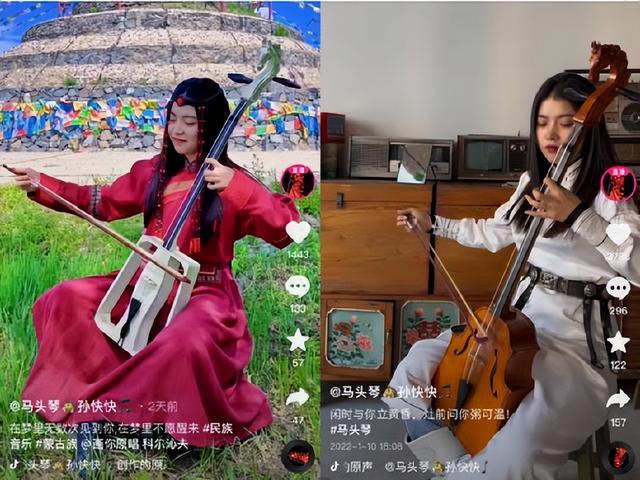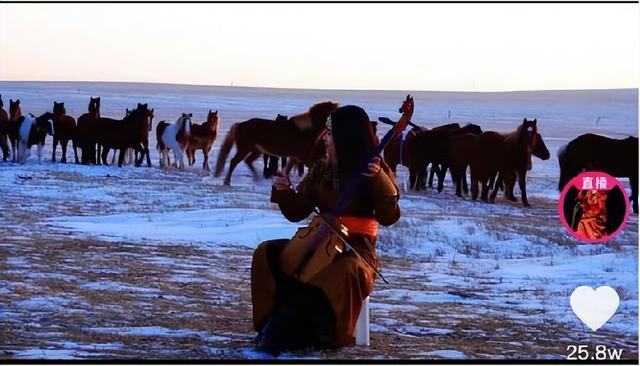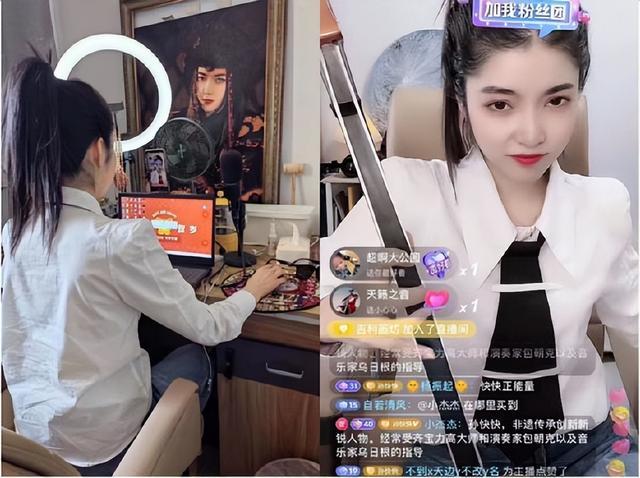Post-90s Inner Mongolia girls live broadcast to make Matouqin "break the circle" and let intangible cultural heritage enter the public eye
At first glance, Sun Kuaikuai is not that kind of traditional folk instrument player. She looks sweet, fashionable and beautiful, and likes motorcycle clothes. If it weren't for the thick calluses on her fingers, it would be hard to imagine that this Mongolian girl born in the 1990s has been playing the matouqin for 20 years.
As one of the most representative musical instruments of the Mongolian people, the matouqin has a history of thousands of years. Although for Sun Kuaikuai, who grew up in Tongliao, Inner Mongolia, matouqin is a musical instrument that he has been familiar with since he was a child. But "it seems to be out of Inner Mongolia, this musical instrument is really very small."

For the past three years, Sun Kuaikuai has been trying to get Matouqin "out of Inner Mongolia" in his own way. As a full-time Matouqin anchor, she will appear in the Douyin live broadcast room every afternoon, pick up the piano and bow, and make friends with music. In the live broadcast room, the audience from all over the world also always asked "what kind of musical instrument is this" at first, and now they will order the representative songs of matouqin on the public screen.
Sun Kuaikuai also earned a decent income through the live broadcast. With this support, she is planning to make matouqin a career: recording online courses to inspire people who always ask "how to learn matouqin" in the live broadcast room. From this step, I will make my own Matouqin personal studio in the future.
Hear "tens of thousands of horses galloping" from the matouqin
Sun Kuaikuai grew up in a family with a strong musical atmosphere. My father came from a keyboard background, my uncle learned to play drums, and my godfather who learned matouqin later became her enlightenment teacher. From the age of eight, Sun Kuaikuai began to learn to play the matouqin. At that time, there were very few girls around who learned matouqin. "Matouqin has requirements for strength, and generally boys have an advantage in learning it." Sun Kuaikuai said.
In the practice day after day, Sun Kuaikuai looked in the mirror every day to confirm whether his sitting posture and holding the piano were correct. Repeatedly practicing the basics, especially the longbow of the matouqin, is "extremely boring", and involves pulling an empty string over and over. Many people who learn matouqin finally choose to give up because they can't insist on drawing the longbow.
At the age of twelve, Sun Kuaikuai's interest in Matouqin was really aroused for the first time. That day, Ms. Matouqin happened to have a concert ticket in her hand, so she went with her. The dedication of the matouqin musician gave her "goosebumps all the time". She still remembers that the song she played at that time was "Ten Thousand Horses Galloping" - a solo piece for the matouqin, in which the neighing of horses galloping on the grassland can be heard. For the first time, the idea of wanting to really learn matouqin appeared in her mind.
After graduating from junior high school, she was admitted to the Horqin Art Vocational College and devoted herself to the study of matouqin. Four hours in the morning and four hours in the afternoon, almost soaking in the piano. When she was in school, she was fortunate to have received the guidance of Qi Bao Ligao, the representative inheritor of Matouqin music. At that time, she followed Qi Bao Ligao to perform a matouqin performance on the school stage. "I was holding the piano at that time, and the teacher looked at the state of my holding the piano and said, this little girl will develop in the future." This sentence further strengthened her confidence in sticking to the professional path of matouqin.

After graduation, Sun Kuaikuai joined the local dance troupe and became a musician. But reality hit her hard. In addition to the low salary, it is difficult to maintain living expenses. More importantly, there are too few performance opportunities. Even if there is a chance, many are just reception performances. Others are staggering at the dinner table, and the performance of the matouqin seems to be just to add to the fun. Sun Kuaikuai decided to leave the dance troupe, this is not the stage for Matouqin that she wanted in her heart.
In 2019, at the suggestion of a friend, she decided to start a live broadcast to try it out. In the beginning, the audience was not large. But she found that although many people do not know Matouqin, they are very interested in Matouqin. And the reward also brings a certain amount of income. Sun Kuaikuai decided to become a full-time anchor. For three years, she has appeared in the live broadcast room with a piano and a bow every day around 4:00 p.m. Tens of thousands of viewers entered her live broadcast room to listen to a piece of matouqin. This is the new career she's looking for for herself.
Let the matouqin go out of Mongolia and be known
With a neat ponytail, Sun Kuaikuai played "Mongols", "Big Fish", "Nuoengiya", "West Sea Love Song" and "The Legend of Genghis Khan" one after another in the live broadcast room. Traditional and modern.
Sun Kuaikuai said that this combination is because the classic works of Matouqin need to be remembered and spread to more young and new friends through new forms. When the live broadcast first started, many people didn't know Matouqin, and some people thought it was an erhu.
The inheritance of matouqin in modern times is not easy. Saqi Ronggui, a young matouqin artist, once said that professional matouqin ensembles in Inner Mongolia have only been established in the past five years, and there are only four or five in number. The older generation of performers is getting old, and the newcomer hasn't grown up to the point of being on their own. Due to the isolation of the region and the aging of the descendants, many excellent matouqin traditions cannot be connected with modern urban life.
Just like Sun Kuaikuai's live broadcast room, until now, newcomers who come for the first time will still ask what musical instrument is this? But it is gratifying that more and more people are already familiar with the representative repertoire of matouqin. . Sun Kuaikuai said that she felt that she had done a meaningful thing when someone knew Ma Touqin because of watching the live broadcast.
Now, in the comments of Sun Kuaikuai's live broadcast room, some people will leave a message, "It seems that I can hear the thanks of the galloping horses." Just like how she felt when she was touched by Matouqin for the first time more than ten years ago.

Like the tens of thousands of national musical instrument anchors who are active on Douyin live broadcast, Sun Kuaikuai found a second online stage here. "Now through a larger platform, we can play the qin to people all over the country and even the world. Not only should we spread the matouqin, but also the story of the grasslands."
After more than three years of live broadcast on Douyin, Sun Kuaikuai’s income from live broadcast rewards has been equal to the cost of going out on stage. It also gave her the courage to go further in her career. Now, she has set up her own studio, wanting to study matouqin more professionally and systematically, and promote the dissemination and development of matouqin. Recently, she is recording the course of matouqin, hoping to make the course as soon as possible, so that those fans who want to learn in the live broadcast room can see it.
 渝公网安备 50010702504639号
渝公网安备 50010702504639号